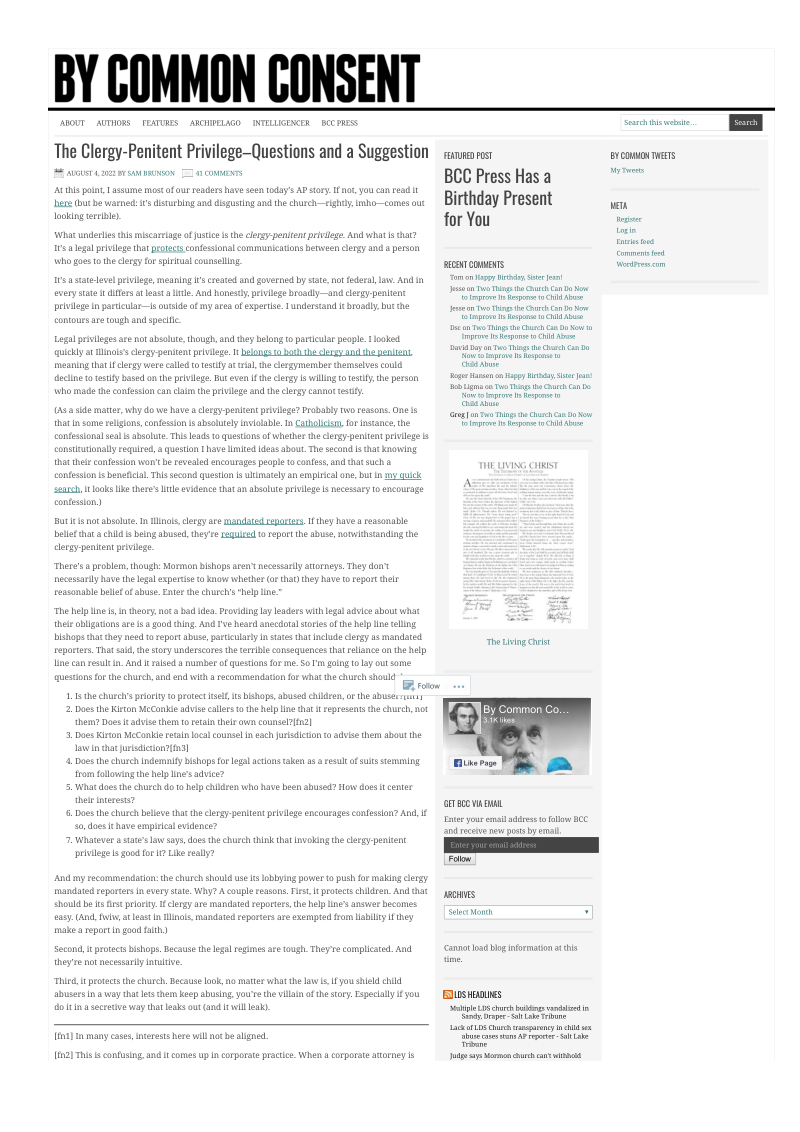Sam Brunson states that the Church should push for mandatory reporters in every state.
- Type
- Website
- Source
- Sam Brunson LDSCritic
- Hearsay
- Direct
- Reference
Sam Brunson, "The Clergy-Penitent Privilege–Questions and a Suggestion," By Common Consent, accessed August 22, 2022
- Scribe/Publisher
- By Common Consent
- People
- Sam Brunson
- Audience
- Internet Public
- Transcription
At this point, I assume most of our readers have seen today’s AP story. If not, you can read it here (but be warned: it’s disturbing and disgusting and the church—rightly, imho—comes out looking terrible).
What underlies this miscarriage of justice is the clergy-penitent privilege. And what is that? It’s a legal privilege that protects confessional communications between clergy and a person who goes to the clergy for spiritual counselling.
It’s a state-level privilege, meaning it’s created and governed by state, not federal, law. And in every state it differs at least a little. And honestly, privilege broadly—and clergy-penitent privilege in particular—is outside of my area of expertise. I understand it broadly, but the contours are tough and specific.
Legal privileges are not absolute, though, and they belong to particular people. I looked quickly at Illinois’s clergy-penitent privilege. It belongs to both the clergy and the penitent, meaning that if clergy were called to testify at trial, the clergymember themselves could decline to testify based on the privilege. But even if the clergy is willing to testify, the person who made the confession can claim the privilege and the clergy cannot testify.
(As a side matter, why do we have a clergy-penitent privilege? Probably two reasons. One is that in some religions, confession is absolutely inviolable. In Catholicism, for instance, the confessional seal is absolute. This leads to questions of whether the clergy-penitent privilege is constitutionally required, a question I have limited ideas about. The second is that knowing that their confession won’t be revealed encourages people to confess, and that such a confession is beneficial. This second question is ultimately an empirical one, but in my quick search, it looks like there’s little evidence that an absolute privilege is necessary to encourage confession.)
But it is not absolute. In Illinois, clergy are mandated reporters. If they have a reasonable belief that a child is being abused, they’re required to report the abuse, notwithstanding the clergy-penitent privilege.
There’s a problem, though: Mormon bishops aren’t necessarily attorneys. They don’t necessarily have the legal expertise to know whether (or that) they have to report their reasonable belief of abuse. Enter the church’s “help line.”
The help line is, in theory, not a bad idea. Providing lay leaders with legal advice about what their obligations are is a good thing. And I’ve heard anecdotal stories of the help line telling bishops that they need to report abuse, particularly in states that include clergy as mandated reporters. That said, the story underscores the terrible consequences that reliance on the help line can result in. And it raised a number of questions for me. So I’m going to lay out some questions for the church, and end with a recommendation for what the church should do:
1. Is the church’s priority to protect itself, its bishops, abused children, or the abuser?
2. Does the Kirton McConkie advise callers to the help line that it represents the church, not them? Does it advise them to retain their own counsel?
3. Does Kirton McConkie retain local counsel in each jurisdiction to advise them about the law in that jurisdiction?
4. Does the church indemnify bishops for legal actions taken as a result of suits stemming from following the help line’s advice?
5. What does the church do to help children who have been abused? How does it center their interests?
6. Does the church believe that the clergy-penitent privilege encourages confession? And, if so, does it have empirical evidence?
7. Whatever a state’s law says, does the church think that invoking the clergy-penitent privilege is good for it? Like really?
And my recommendation: the church should use its lobbying power to push for making clergy mandated reporters in every state. Why? A couple reasons. First, it protects children. And that should be its first priority. If clergy are mandated reporters, the help line’s answer becomes easy. (And, fwiw, at least in Illinois, mandated reporters are exempted from liability if they make a report in good faith.)
Second, it protects bishops. Because the legal regimes are tough. They’re complicated. And they’re not necessarily intuitive.
Third, it protects the church. Because look, no matter what the law is, if you shield child abusers in a way that lets them keep abusing, you’re the villain of the story. Especially if you do it in a secretive way that leaks out (and it will leak).
- Citations in Mormonr Qnas
The B. H. Roberts Foundation is not owned by, operated by, or affiliated with the Church of Jesus Christ of Latter-day Saints.

